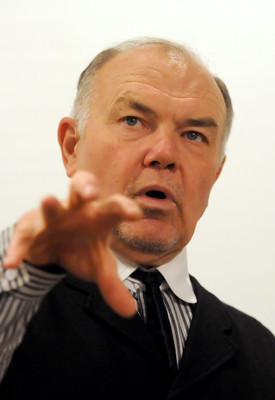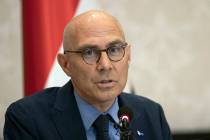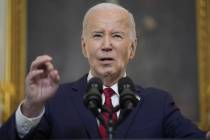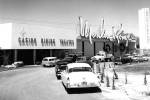History lover turns back clock
GARDNERVILLE -- The burly man in old-time Western clothes tells the crowd about the time he owned an eastern Nevada cattle ranch larger than four Eastern states.
He made a fortune in the cattle business, the big man says, and then threw it all "down a hole."
He wasn't the first to lose everything in the harsh economic times, he adds. Bad mining investments have taken many a man's fortune. The Panic of '07 didn't help either.
Most of the 50 people listening to the man at the Carson Valley Museum and Cultural Center are senior citizens, but none can remember the economic panic of 1907, gunslinger "Diamondfield" Jack Davis or the time when federal troops were called to put down labor unrest in the Goldfield mines.
But the man in long black boots talks as if it all happened yesterday. He insists these people call him John Sparks and extend him the respect deserving a Nevada governor, which he was from 1903 to 1908.
He can insist all he wants, but the people sometimes call him "Mike."
They have known him for too long as Dr. Michael Fischer, a local dentist and former member of the Douglas County Commission. That was how Fischer, 59, earned his living until Gov. Jim Gibbons offered him a job in January 2007.
Fischer ended a 31-year dental career to become director of the state Department of Cultural Affairs, the agency that oversees the divisions of Museums and History, the state Library and Archives, the State Historic Preservation Office and the Nevada Arts Council. The post pays $115,000 a year.
Unfortunately, a few months after Fischer took his new job, the state economy slumped, forcing him to cut the department's $16 million a year budget to $13.9 million. More cuts are likely.
He may have to temporarily close the state's railroad depot museum in Ely. And there is a chance he will have to delay opening the new $52 million state museum at the Las Vegas Springs Preserve when it is completed next year.
People such as conservative political consultant and blogger Chuck Muth have called for shutting down Fischer's entire department as the state struggles to find an additional $300 million to cut in the current fiscal year budget.
Fischer calls himself a "pretty conservative guy" who remembers past bad times, including when he felt fortunate to secure an 18 percent interest loan so he could open a dental office in Douglas County.
But the value of museums cannot be measured in dollars, he said.
"Exposure to art, history and museums widens people's appreciation for their state. We need to know our story. Many people moved there from somewhere else and do not know our history. Where else for 10 bucks can two adults and four kids go through a museum for half a day and get an education about a Nevada they are not familiar with? Kids have an opportunity to fall in love with their state.
"But we are like everybody else. We have to live with the money we have."
Even though Fischer has been scrambling for dollars, taking the cultural affairs job was kind of like a kid getting a shopping spree at Toys 'R' Us.
"I get up in the morning and love what I am doing. I love the history. I love the art. I love Nevada," he said.
For the past five years, he has given theatrical performances as Sparks and Henry F. Dangberg, an early Nevada rancher whose family founded Minden.
Except for Sparks' long mustache and Dangberg's beard, the two look surprising alike when Fischer climbs on stage.
"I am very good at memorizing facts," he said. "I thought it would be fascinating to pretend to be someone else. We are all actors. I am no great reciter, but I try to climb in their skin and understand what they were."
He is no Hal Holbrook, but Fischer delights in remaining in character even when friends in the audience try to trip him up.
For much of his adult life, Fischer's bedtime reading consisted of books about Nevada history and the state's colorful characters, including gaming figures. But it hasn't been all academic for him.
As a young man, he cowboyed in Paradise Valley, where some of the old cowboys told stories about Sparks. During his early years as a dentist in Douglas County, Fischer cowboyed part time on the Dangberg Ranch, where wranglers were full of stories about Dangberg.
"I worked three days on the ranch and three days as a dentist," he said. "I worked on the ranch for fun."
He still lives in Douglas County and rides a horse. For a time, he raised Black Angus cattle.
There are few direct quotations found for cattle baron Sparks, but Fischer strives to portray him as realistically as he can.
A portrait of the 6-foot-3 Sparks hangs near the entrance to the governor's office in the Capitol. It shows a man who resembles bad guy Western actor Lee Van Cleef of "The Good, the Bad and the Ugly" fame.
When it came to protecting his ranch near Wells, Sparks didn't hesitate to play fast and loose with the law. He hired Davis as a gunslinger to discourage sheepherders from venturing onto his ranch.
Davis was a guy who "shot off his mouth" a bit too much, according to Fischer. He ended up being convicted of a sheepman's murder and ultimately confessed to others.
"Sparks allegedly spent a fortune on his defense," Fischer said. "He basically told his people to shoot to wound, not to kill, but if you must kill there are many resources in the company, and we will help you."
Loyal to Sparks to the end, Davis was his bodyguard when the governor traveled to Goldfield to see what was causing labor unrest in the mines. Davis died ignobly when a car in Las Vegas hit him as he crossed a street.
Sparks' defense of Goldfield mining operators' interests led to a decline in his popularity, according to Fischer, although he doesn't view him as an anti-labor governor.
What irked Sparks was that miners were stealing ore and making money off their thievery, Fischer said.
In Sparks' code of conduct, stealing horses, gold or silver was simply unconscionable.
"He did everything you could do in the West. He made a fortune, went broke, fought Indians, drove cattle up the trail from Texas to Wyoming," he said.
Fischer knows so much about Sparks that he can tell you the artist mistakenly drew Sparks' lodge medallion upside down in the portrait in the Capitol.
The ranch house from Sparks' palatial Alamo Ranch in Reno was moved south to the Pleasant Valley area along U.S. Highway 395 about 20 years ago. Anyone who drives the highway between Reno and Carson City has noticed the magnificent building, although most probably still wonder what historical figure built it.
Sparks died in office. He caught pneumonia riding in an open-air automobile back to Reno from Carson City for an appointment in 1907.
Fischer said Sparks "toughed it out" during the special legislative session he called in 1908 to create the state police, but he died that May 22.
Although Sparks was governor when Las Vegas was founded, Fischer has not found evidence that he visited the new town.
"When he was governor, Goldfield was the biggest town in the state," Fischer said. "Las Vegas was a sleepy little burg into the 1930s."
Contact Capital Bureau Chief Ed Vogel at evogel@reviewjournal.com or 775-687-3901.





























